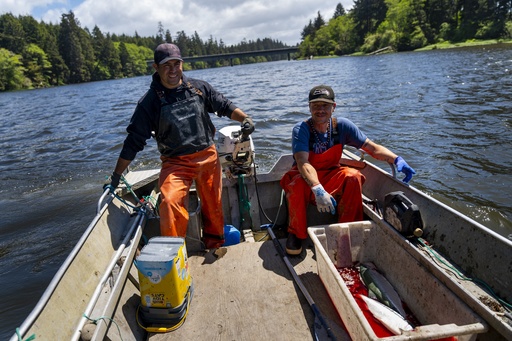Sonny Curley resides with his parents and three children in a home on the Quinault reservation near the Pacific Ocean in Washington’s Olympic Peninsula. The house is impacted by standing water, rotting back deck, and walls speckled with black mold, causing health issues for the 46-year-old fisherman. The ocean has crept closer over the past 15 years, now sometimes topping a 15-foot seawall, leading to repeated evacuations for the family and added stress for the elderly members.
The Quinault Indian Nation has been addressing rising sea levels and increasing flooding in Taholah by attempting to relocate hundreds of residents and civic buildings to higher ground. But funding remains a significant obstacle, with federal and state grants falling short of the estimated $400 million needed for relocation efforts.
Tribes in the U.S. are struggling with the severe impacts of climate change and have limited resources to respond. Coastal tribes, preparing for a projected rise in sea levels, have started taking steps towards relocation, similar to the efforts of the Quinault Indian Nation and other tribes such as the Shoalwater Bay Indian Tribe and Newtok Village in Alaska.
The Quinault Tribe, historically known for fishing and hunting, now faces the threat of losing key sections of their reservation due to sea-level rise. Taholah’s location near the ocean and on easily infiltrated estuary soils makes it particularly vulnerable to rising sea levels, with frequent flooding incidents causing property damage and health risks from mold.
The Quinault Tribe has declared flooding-related disasters multiple times over the years, with projections indicating a rise in sea levels by 1 to 2.6 feet by 2100. Efforts to relocate the community to a safer location have been slow, despite plans for a climate-resilient village with sustainable energy sources and agricultural provisions.
The tribe has secured some funding for the relocation project, but bureaucratic processes have delayed progress, leaving many residents in uncertain situations. While some residents, like James DeLaCruz Sr., find solace in living close to the ocean despite the risks, others, like the Curley family, recognize the urgent need to relocate to ensure their safety and well-being.
The complex relationship between tribal communities and their environment, particularly the ocean, is evident in the struggles faced by the Quinault Tribe as they navigate the challenges of climate change and strive to secure a sustainable future for their people.
This website uses cookies so that we can provide you with the best user experience possible. Cookie information is stored in your browser and performs functions such as recognising you when you return to our website and helping our team to understand which sections of the website you find most interesting and useful.
